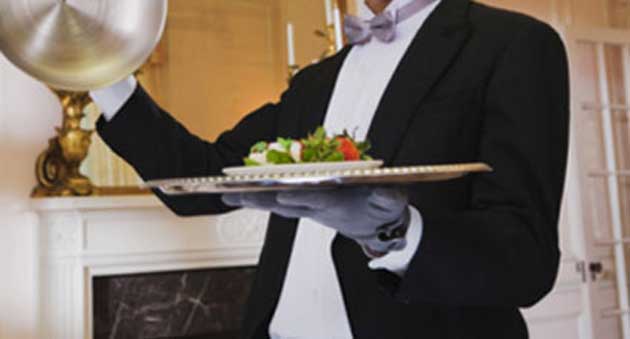The Butler Did It

When we think of a butler, Jeeves comes to mind for many of us – an older, grey-haired manservant ironing newspapers with a sarcastic expression on his face. On the contrary, says Charles MacPherson, founder of the Charles MacPherson Academy School for Butlers and Household Managers: “They make funny jokes and they drink the cooking sherry in the butler’s pantry. It’s all for comedic effect. In reality, we are very hard-working people.”
MacPherson’s school started as a small concierge business that, over 15 years, evolved into teaching butlers all they need to know to run a household. “As we’ve grown up over the years, we expanded into a product line and then ultimately into the school.”
With nearly 50,000 professional butlers in the world today, MacPherson’s is the only school in North America qualified to train butlers.
Students learn a number of diverse topics from cigars and household appliances to party planning and even how to cook an egg. “You’ll be surprised how many students leave that class and say, ‘I have been cooking eggs wrong this whole time!’” says MacPherson.
Butlering has certainly modernized over the years, but has it modernized to the extent of including females in the industry? The answer is yes –and no. “In households, 10 per cent of butlers are women and 90 per cent men. In the hotel industry, where butlers have been quite popular since about 2000, it is about 50 per cent women and 50 per cent men. I think the hotel industry is much more advanced.”
The hotel industry is most likely a little more advanced than Buckingham Palace where Tristan Rees Jones worked as one of the Queen’s footman. Reese says Buckingham Palace has evolved over the past 50 years and is run similar to a hotel, with each individual having a very specific job unlike the modern butler who performs a number of diverse tasks (segue to MacPherson’s school slogan: “The butler did it because today’s butler can do almost everything”).
While working for the Queen, one of Reese’s jobs included looking after her nine dogs, feeding them rabbit and beef, with the exception of some who were on a serious diet. Also, he was in charge of luggage logistics, literally looking after cases full of jewels, including her crown.
Generally, those who hire butlers are blessed with a big budget: the average butler earns $50,000 to $150,000 a year including bonus incentives. Some salaries include accommodations, food and automobiles. The advantages of being a butler include travelling and seeing sights that they would not normally have the chance to see, says MacPherson. What else? Living vicariously through some of the most significant moments of these families lives, especially the families that are famous. “When you are a butler at the White House or at Buckingham Palace, you see history in the making. If you are a butler for a very famous entertainer, you see the art and the artist making some type of wonderful music or something really fabulous . . . I think one of the best things is that you are a fly on the wall watching history and the like happen.”
One of the largest disadvantages? Not being able to tell anyone the wonderful and fabulous events you encounter on a daily basis. “The true consummate butler has to be able to keep their tongue. That is what makes a great butler.”